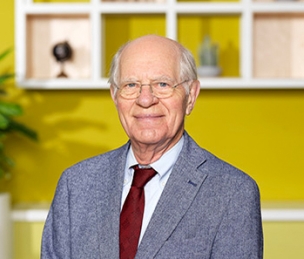Displaying 1 - 14 of 14
-
Levelt, W. J. M., & Ruijssenaars, A. (1995). Levensbericht Johan Joseph Dumont. In Jaarboek Koninklijke Nederlandse Akademie van Wetenschappen (pp. 31-36).
-
Levelt, W. J. M. (1995). Chapters of psychology: An interview with Wilhelm Wundt. In R. L. Solso, & D. W. Massaro (
Eds. ), The science of mind: 2001 and beyond (pp. 184-202). Oxford University Press. -
Levelt, W. J. M. (1995). Hoezo 'neuro'? Hoezo 'linguïstisch'? Intermediair, 31(46), 32-37.
-
Levelt, W. J. M. (1995). Psycholinguistics. In C. C. French, & A. M. Colman (
Eds. ), Cognitive psychology (reprint, pp. 39- 57). London: Longman. -
Levelt, W. J. M. (1995). The ability to speak: From intentions to spoken words. European Review, 3(1), 13-23. doi:10.1017/S1062798700001290.
Abstract
In recent decades, psychologists have become increasingly interested in our ability to speak. This paper sketches the present theoretical perspective on this most complex skill of homo sapiens. The generation of fluent speech is based on the interaction of various processing components. These mechanisms are highly specialized, dedicated to performing specific subroutines, such as retrieving appropriate words, generating morpho-syntactic structure, computing the phonological target shape of syllables, words, phrases and whole utterances, and creating and executing articulatory programmes. As in any complex skill, there is a self-monitoring mechanism that checks the output. These component processes are targets of increasingly sophisticated experimental research, of which this paper presents a few salient examples. -
Wheeldon, L. R., & Levelt, W. J. M. (1995). Monitoring the time course of phonological encoding. Journal of Memory and Language, 34(3), 311-334. doi:10.1006/jmla.1995.1014.
Abstract
Three experiments examined the time course of phonological encoding in speech production. A new methodology is introduced in which subjects are required to monitor their internal speech production for prespecified target segments and syllables. Experiment 1 demonstrated that word initial target segments are monitored significantly faster than second syllable initial target segments. The addition of a concurrent articulation task (Experiment 1b) had a limited effect on performance, excluding the possibility that subjects are monitoring a subvocal articulation of the carrier word. Moreover, no relationship was observed between the pattern of monitoring latencies and the timing of the targets in subjects′ overt speech. Subjects are not, therefore, monitoring an internal phonetic representation of the carrier word. Experiment 2 used the production monitoring task to replicate the syllable monitoring effect observed in speech perception experiments: responses to targets were faster when they corresponded to the initial syllable of the carrier word than when they did not. We conclude that subjects are monitoring their internal generation of a syllabified phonological representation. Experiment 3 provides more detailed evidence concerning the time course of the generation of this representation by comparing monitoring latencies to targets within, as well as between, syllables. Some amendments to current models of phonological encoding are suggested in light of these results. -
Levelt, W. J. M. (1991). Die konnektionistische Mode. Sprache und Kognition, 10(2), 61-72.
-
Levelt, W. J. M. (1991). Lexical access in speech production: Stages versus cascading. In H. Peters, W. Hulstijn, & C. Starkweather (
Eds. ), Speech motor control and stuttering (pp. 3-10). Amsterdam: Excerpta Medica. -
Levelt, W. J. M., Schriefers, H., Vorberg, D., Meyer, A. S., Pechmann, T., & Havinga, J. (1991). Normal and deviant lexical processing: Reply to Dell and O'Seaghdha. Psychological Review, 98(4), 615-618. doi:10.1037/0033-295X.98.4.615.
Abstract
In their comment, Dell and O'Seaghdha (1991) adduced any effect on phonological probes for semantic alternatives to the activation of these probes in the lexical network. We argue that that interpretation is false and, in addition, that the model still cannot account for our data. Furthermore, and different from Dell and O'seaghda, we adduce semantic rebound to the lemma level, where it is so substantial that it should have shown up in our data. Finally, we question the function of feedback in a lexical network (other than eliciting speech errors) and discuss Dell's (1988) notion of a unified production-comprehension system. -
Levelt, W. J. M., Schriefer, H., Vorberg, D., Meyer, A. S., Pechmann, T., & Havinga, J. (1991). The time course of lexical access in speech production: A study of picture naming. Psychological Review, 98(1), 122-142. doi:10.1037/0033-295X.98.1.122.
-
Levelt, W. J. M., & Kempen, G. (1979). Language. In J. A. Michon, E. G. J. Eijkman, & L. F. W. De Klerk (
Eds. ), Handbook of psychonomics (Vol. 2) (pp. 347-407). Amsterdam: North Holland. -
Levelt, W. J. M. (1979). The origins of language and language awareness. In M. Von Cranach, K. Foppa, W. Lepenies, & D. Ploog (
Eds. ), Human ethology (pp. 739-745). Cambridge: Cambridge University Press. -
Levelt, W. J. M. (1979). On learnability: A reply to Lasnik and Chomsky. Unpublished manuscript.
-
Stassen, H., & Levelt, W. J. M. (1979). Systems, automata, and grammars. In J. Michon, E. Eijkman, & L. De Klerk (
Eds. ), Handbook of psychonomics: Vol. 1 (pp. 187-243). Amsterdam: North Holland.

Share this page